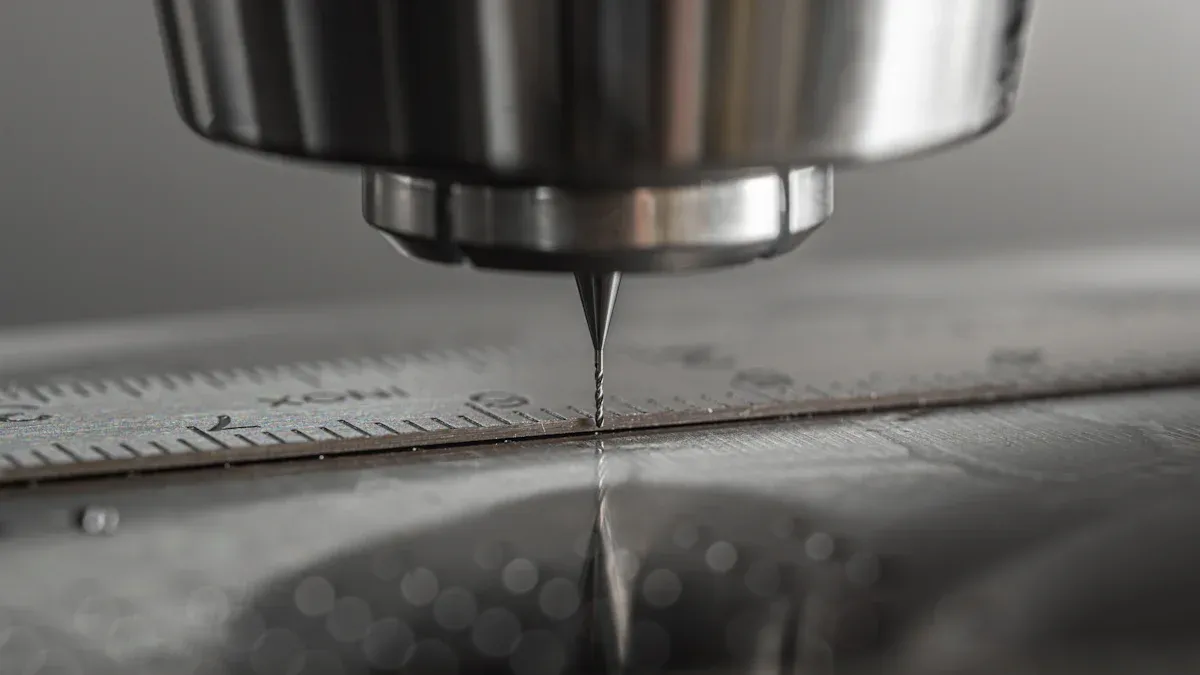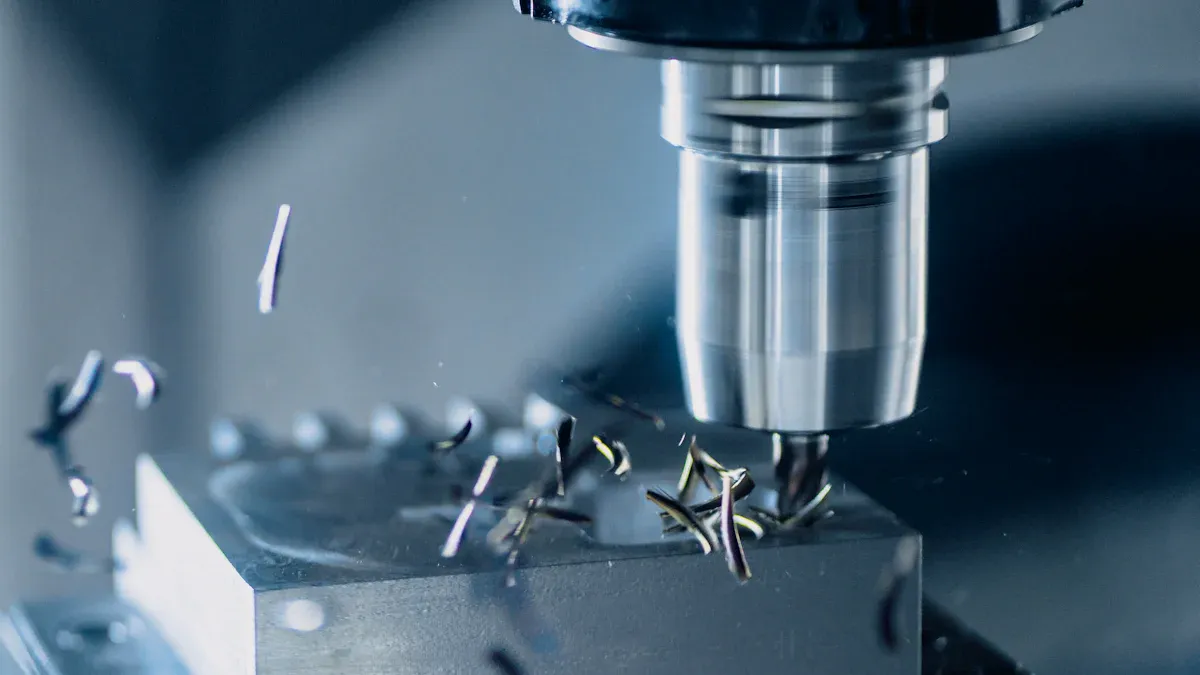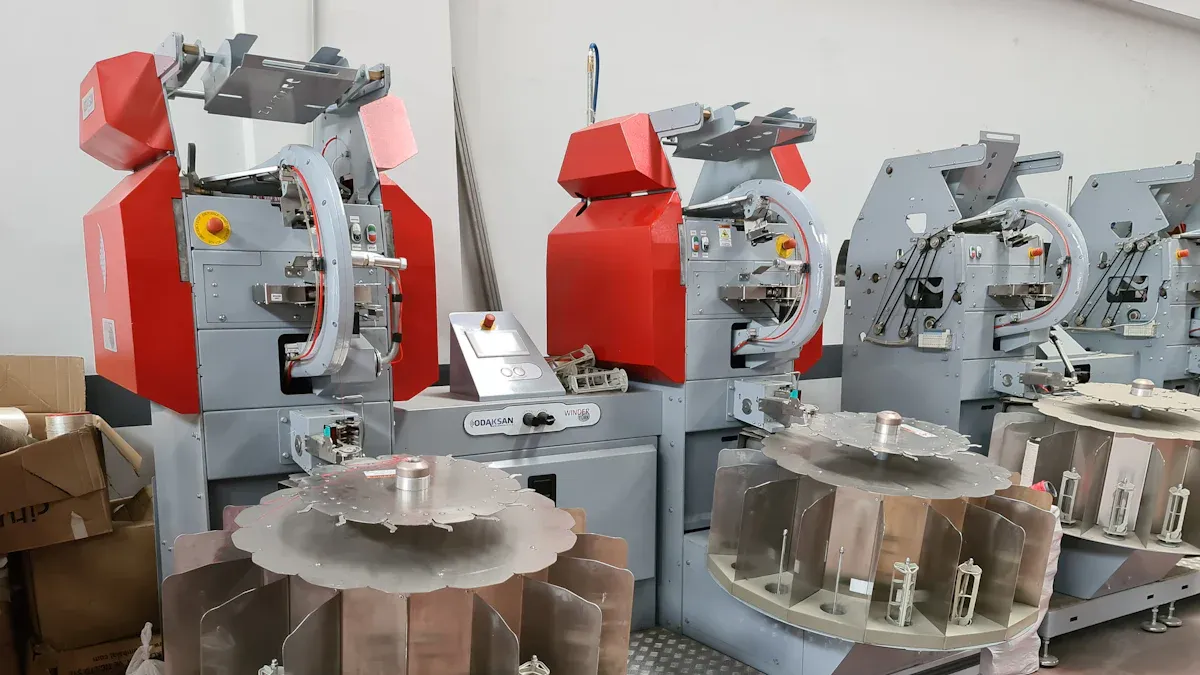CNC Machining for complex geometries and detailed designs

CNC machining plays a vital role in creating intricate and precise parts for various industries. Its ability to handle complex geometries ensures unmatched accuracy. Industries like aerospace, medical, and automotive rely on high-quality CNC machining to meet their demands. The global CNC machine market, projected to reach $128.86 billion by 2026, highlights its growing importance.
Key Takeaways
CNC machining is very precise, with tolerances of +/- 0.002 inches. This level of accuracy is important for fields like aerospace and medical.
Multi-axis machines can make complex shapes with fewer setups. This saves time and lowers mistakes, which is key for precise industries.
Picking the right material is important for CNC machining. Knowing material traits helps get better results and protects tools from wearing out.
CNC Machining for Complex Parts: Capabilities and Benefits

Precision and Accuracy in Complex Geometries
CNC machining technology delivers unmatched precision when working with intricate geometries. You can rely on its advanced capabilities to achieve tolerances as tight as +/- 0.002 inches, ensuring parts meet exact specifications. This level of accuracy is essential for industries like aerospace and medical devices, where even minor deviations can lead to failures. For example, multi-axis operations allow the creation of undercuts and deep cavities, which are impossible with traditional methods.
To enhance precision, CNC machines use precise tooling such as ball nose cutters for 3D contours and thread mills for threading. Quality assurance processes, including in-process inspections and CMM inspections, ensure every part meets high standards. These precision solutions simplify assembly by producing components that fit perfectly without adjustments.
Multi-Axis Machining for Detailed Designs
Multi-axis machining revolutionizes the production of complex designs. Machines with 4-axis and 5-axis capabilities allow you to create intricate geometries with fewer setups, reducing errors and saving time. For instance, 5-axis machines can simultaneously rotate and mill, enabling the production of custom components with complex shapes. This versatility is crucial for industries like automotive and aerospace, where high precision and efficiency are non-negotiable.
Advanced CAM software plays a vital role in this process. It optimizes tool paths and ensures smooth transitions between operations, enhancing both speed and accuracy. By leveraging multi-axis capabilities, you can achieve detailed designs that traditional methods cannot replicate.
Scalability and Efficiency in Manufacturing
CNC machining for complex parts excels in scalability and efficiency. Automation in CNC machining allows machines to operate continuously, maximizing output while minimizing human intervention. This process optimization reduces labor costs and ensures consistent quality across large production runs. For example, industries like electronics and automotive benefit from the ability to produce high volumes of intricate geometries with minimal waste.
High-quality CNC machining also supports custom projects by adapting to varying production needs. Whether you require a single prototype or mass production, CNC machining technology ensures cost-effective and timely results. Its advanced technology streamlines manufacturing, making it an ideal choice for both small-scale and large-scale operations.
Overcoming Challenges in Machining Complex CNC Parts
Material Selection and Machinability
Choosing the right material is critical when working with complex CNC machined parts. Each material's properties, such as hardness, strength, and thermal conductivity, directly impact machinability. Harder materials like stainless steel or titanium often generate high cutting forces, leading to rapid tool wear. On the other hand, softer materials like PTFE may deform easily, creating excessive heat during machining. Uniform microstructures improve machinability, while coarse structures can complicate the process.
Material | Challenges |
|---|---|
Stainless Steel | Poor machinability, high cutting forces, rapid tool wear |
Titanium | High strength, low thermal conductivity, work hardening |
PTFE | Soft, deforms easily, generates excessive heat |
UHMWPE | Produces stringy chips, heat generation |
Understanding these challenges helps you select materials that balance durability and machinability, ensuring high-quality CNC machining results.
Advanced Tooling and Machine Setup
Advanced tooling and precise machine setup play a vital role in machining complex geometries. High-performance cutting tools made from materials like carbide and ceramic improve durability and cutting speeds. Cryogenic machining reduces heat buildup, extending tool life and enhancing precision. Micromachining enables the production of miniature components with tight tolerances, while automation through robotics minimizes human error and boosts efficiency.
Proper machine setup ensures stability and accuracy. A stable machine structure reduces vibrations, while accurate tool path control prevents deviations. Advanced measurement systems with sensors and feedback loops monitor tool positions in real time, ensuring precise machining of internal cavities. These advancements allow you to tackle the complexity of modern designs with confidence.
Simulation Tools for Design Complexity
Simulation tools simplify the process of machining complex CNC parts by identifying potential issues before production begins. These tools validate dimensions, tolerances, and surface finishes, ensuring product quality and consistency. By detecting errors in CNC code, simulation software prevents costly mistakes and reduces material waste. Faster setups and fewer adjustments mean you can focus on production rather than troubleshooting.
Simulation tools also help optimize programming for complex geometries, minimizing the need for manual adjustments. This reduces downtime and ensures smoother operations. By leveraging these tools, you can achieve precise machining of intricate designs, including internal cavities, while maintaining efficiency and accuracy.
Design Optimization for CNC Machining of Complex Geometries

Simplifying Designs for Manufacturability
Simplifying designs improves manufacturability and reduces machining time. Removing unnecessary features while retaining functionality ensures efficiency. For example, consistent wall thickness prevents warping and maintains structural integrity. Avoiding sharp internal corners by using filleted edges reduces stress concentrations and enhances tool accessibility. These adjustments streamline the machining process without compromising part quality.
Designing with manufacturability in mind also involves minimizing intricate features. Reducing tall or thin structures improves machining stability. Shallow cavities are easier to machine and maintain precision compared to deep ones. Incorporating standard hole sizes and threads eliminates the need for custom tools, saving time and costs. By applying these principles, you can optimize your designs for CNC machining while maintaining the desired complexity.
"Using radii instead of sharp corners and reducing tall features can significantly improve machining stability and reduce tool wear."
Leveraging Multi-Axis Capabilities
Multi-axis CNC machining offers unmatched flexibility for intricate geometries. Machines with 4-axis or 5-axis capabilities handle complex designs in fewer setups, reducing errors and production time. For instance, 5-axis machines can rotate and mill simultaneously, enabling the creation of detailed CAD models with exceptional precision. Adaptive tool pathing further optimizes the process by minimizing unnecessary tool movements.
Industries like aerospace and medical benefit greatly from multi-axis machining. Turbine blades, engine blocks, and custom prosthetics are examples of parts produced with high accuracy and reduced lead times. These machines also allow you to achieve intricate geometries that would be impossible with traditional methods. Leveraging multi-axis capabilities ensures precision solutions for even the most complex designs.
Industry | Application | Benefits |
|---|---|---|
Aerospace | Turbine blades | Reduced production time by 40%, high precision |
Automotive | Engine blocks | Enhanced precision, reduced setups by 30% |
Medical | Custom prosthetics | Improved fit and comfort, reduced lead time |
Collaborating with CNC Experts for Optimal Results
Collaborating with CNC experts during the design phase ensures optimal results. These professionals provide insights into material selection, tooling, and programming, helping you navigate design complexity. Their expertise ensures your CAD designs are optimized for manufacturability, reducing costs and machining time. Outsourcing CNC machining also allows you to focus on core operations while benefiting from advanced automation and precision solutions.
CNC experts can adapt designs based on customer requirements and job demands. They help you leverage automation to enhance production efficiency and improve part quality. By working closely with these specialists, you can achieve detailed CAD models and intricate geometries with minimal errors. This collaboration ensures your designs meet both functional and aesthetic requirements.
CNC machining offers unmatched precision and versatility, making it indispensable for complex geometries. To overcome challenges, you can focus on design simplification, material selection, and tool path optimization. Industries like aerospace and automotive rely on CNC machining for its efficiency and adaptability. Its advancements continue to shape modern manufacturing, ensuring innovation and quality.
FAQ
What industries benefit the most from CNC machining for complex geometries?
Aerospace, medical, and automotive industries benefit greatly. You can rely on CNC machining for precision parts like turbine blades, prosthetics, and engine components.
How does multi-axis machining improve production efficiency?
Multi-axis machining reduces setups and errors. It allows you to create intricate designs faster by handling complex geometries in a single operation.
Can CNC machining handle all types of materials?
CNC machining works with most materials, including metals, plastics, and composites. However, you must consider machinability and tool wear for harder materials like titanium or stainless steel.
See Also
Streamlined CNC Machining Solutions for Accurate Production
Perfecting CNC Machining Techniques for Precise Component Creation
Investigating CNC Machining Options for High-Precision Production
Is CNC Milling a Viable Alternative to CNC Engraving?
Addressing Machining Challenges: NC Milling Versus CNC Engraving
About US
Follow Us
Your prototype holds unparalleled significance, and we deeply value its uniqueness. Collaborating with you during the preparation phase for running your prototype or parts is a commitment we gladly embrace. Whether it's a single part or a complex assembly, we are dedicated to selecting the optimal tools and pathways to bring your envisioned product to life.
At Precision Fab CNC Machining, we specialize in producing parts for prototypes, short runs, and high-volume production. Our prototyping machine capabilities extend across metal, plastic, and wood machining, with welding fabrication services available to complement and finalize your prototype if required.
Address
Address: Room320 10F, Building A,Nanshan international building, Dayawan District, Huizhou, Guangdong, 516001 China
Contacts
billy@timaycnc.com

